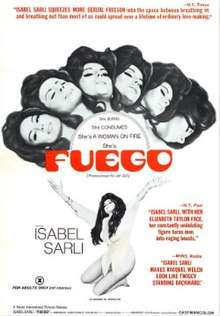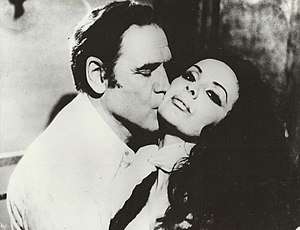Fuego (1969 film)
Fuego (Spanish for "fire") is a 1969 Argentine sexploitation film written, produced and directed by Armando Bó and starring Isabel Sarli. It is one of the many erotic films that the couple made between 1959 and 1980.
| Fuego | |
|---|---|
 American theatrical release poster | |
| Directed by | Armando Bó |
| Produced by | Armando Bó |
| Written by | Armando Bó |
| Starring | Isabel Sarli Armando Bó |
| Music by | Humberto Ubriaco Armando Bó |
| Cinematography | Ricardo Younis |
| Edited by | Rosalino Caterbetti |
Production company | Sociedad Independiente Filmadora Argentina (S.I.F.A.) |
| Distributed by | Haven International Pictures (U.S.) |
Release date | 10 October 1969 (U.S.) 23 September 1971 (Argentina) |
Running time | 84 minutes |
| Country | Argentina |
| Language | Spanish |
Cast
- Isabel Sarli as Laura
- Armando Bó as Carlos
- Alba Mujica as Andrea
- Roberto Airaldi as Dr. Salazar
- Hugo Mujica as Jorge
- Oscar Valicelli as Mechanic
- Miguel A. Olmos as Driver
Production
The film was shot between 1968 and 1969 in the Patagonian town of San Martín de los Andes and New York City.
Release
The film could not be released originally in Argentina, at that time governed by military dictator Juan Carlos Onganía. Advised by Jaime Cabouli, a well-known distributor, Bó and Sarli went to New York City with the film's negative.[1][2]
Critical reception
American film critic Roger Greenspun gave the film a positive review, writing in The New York Times that "Isabel Sarli squeezes more sexual frisson into the space between breathing in and breathing out than most of us could spread over a lifetime of ordinary love-making."[3]
Legacy
— John Waters, John Waters Presents Movies That Will Corrupt You, 2006.[3]
Fuego has been considered "a milestone in the history of Argentine cinema" and one of Sarli's "erotic peaks".[4] The relationship between Isabel Sarli and Alba Mujica's characters is one of the first representations of lesbianism in Argentine cinema.[5] Lucía Brackes of Los Andes reflected in 2012 that "Coca is such a whore that she becomes a lesbian, a revolutionary and almost militant idea about the oppressed condition of women."[6]
John Waters has declared himself a big fan of Sarli's films, citing Fuego as his favorite.[7] He and Divine were admirers of Sarli and watched her movies in New York City's grindhouses.[7] Waters presented Fuego as his annual selection in the 2002 Maryland Film Festival and featured it in his 2006 Here! network original series John Waters Presents Movies That Will Corrupt You, where he described it as "a hetero film for gay people to marvel at."[8] The director and Sarli finally met in 2018 on the occasion of the BAFICI film festival in Buenos Aires, where he gave her an award for her career and interviewed her on video.[7]
In 2010, the Film Society of Lincoln Center paid tribute to Sarli with a retrospective titled "Fuego: The Films of Isabel 'Coca' Sarli", screening five of her films in addition to Diego Curubeto's Carne Sobre Carne: Intimidades de Isabel Sarli, a documentary focusing on her career.[3] Richard Corliss of Time wrote: "Seeing them today, nearly a half-century after they were made, a moviegoer thinks of lurid Hollywood love stories like Duel in the Sun, but with a much higher body temperature, and especially of Latin American telenovelas, those churning mixtures of female concupiscence and narrative coincidence. The world-class Spanish writer-director Pedro Almodóvar learned much from them, though it's not known if he used the Sarli-Bó films as his models."[3]
Notes
- "Combate contra la censura". La Nación (in Spanish). January 8, 2003. Retrieved March 8, 2020.
- Isabel Sarli, Fernando Martin Peña, Fabio Manes (September 25, 2012). Filmoteca (Television production) (in Spanish). Televisión Pública Argentina.
- Corliss, Richard (7 August 2010). "Isabel Sarli: A Sex Bomb at Lincoln Center". Time. Retrieved 28 June 2019.
- "Isabel la "Coca" Sarli: de aquel desnudo casi revolucionario al personaje de culto". Clarín (in Spanish). 25 June 2019. Retrieved 28 June 2019.
- Ranzani, Oscar (26 June 2019). "Murió Isabel "la Coca" Sarli". Página/12 (in Spanish). Retrieved 1 July 2019.
- Brackes, Lucía (25 October 2012). "El último Bo". Los Andes (in Spanish). Retrieved 1 July 2019.
- Isabel Sarli y John Waters (video). BAFICI on Facebook. 16 April 2018. Retrieved 28 June 2019.
- "Carta de un león a otro". Página/12 (in Spanish). 23 October 2009. Retrieved 28 June 2019.
References
- Arnaud, Charlotte; Collectif; Courtemanche, Philippe; Fernandes, Carla; Morsch Kihn, Eva (1999). Cinémas d'Amérique latine N° 7/1999. Presses Univ. du Mirail. pp. 32–50. ISBN 978-2858164479. Retrieved 15 July 2019.
- Braslavsky, Eliana; Drajner Barredo, Tamara; Pereyra, Bárbara (2013). "Insaciable (Armando Bo, 1984), entre la liberación sexual y el castigo moralizante". Imagofagia. Revista de la Asociación Argentina de Estudios de Cine y Audiovisual (in Spanish) (8). ISSN 1852-9550. Retrieved March 8, 2020.
External links
| Wikimedia Commons has media related to Fuego (1969 film). |
- Fuego at AllMovie
- Fuego on Cinenacional.com
- Fuego on IMDb
- Fuego at Rotten Tomatoes
